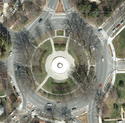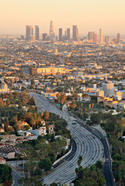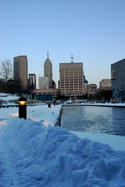Urban Issues
President Obama's stated objective to reduce inequality, as laid out in public addresses and budget plans, is a noble one. The growing income gap – not only between rich and poor, but also between the ultra-affluent and the middle class – poses a threat both to the economy and the long-term viability of our republic.
But ironically, what seems to be the administration's core proposal, ratcheting up the burden on "rich" taxpayers earning over $250,000, could have unintended consequences. For one thing, it would place undue stress on the very places that have been Obama's strongest supports, while providing an unintended boost to those regions that most oppose him. read more »
This is the Democratic Party's moment, its power now greater than any time since the mid-1960s. But do not expect smooth sailing. The party is a fractious group divided by competing interests, factions and constituencies that could explode into a civil war, especially when it comes to energy and the environment.
Broadly speaking, there is a long-standing conflict inside the Democratic Party between gentry liberals and populists. This division is not the same as in the 1960s, when the major conflicts revolved around culture and race as well as on foreign policy. Today the emerging fault-lines follow mostly regional, geographical and, most importantly, class differences. read more »
On the 200th anniversary of the birth of Abraham Lincoln, C-SPAN watchers nationwide saw an especially poignant symbolic moment. Assembled on the floor of the Capitol Rotunda, along with House and Senate members, were hundreds of guests. Behind every speaker stood the marble statue of Abraham Lincoln, bending benignly, holding in his outstretched hand a folded Emancipation Proclamation. read more »
Next week, Antonio Villaraigosa will be overwhelmingly re-elected mayor of Los Angeles. Do not, however, take the size of his margin – he faces no significant opposition – as evidence that all is well in the city of angels.
Whatever His Honor says to the media, the sad reality remains that Los Angeles has fallen into a serious secular decline. This constitutes one of the most rapid – and largely unnecessary – municipal reversals in fortune in American urban history. read more »
For decades, California has epitomized America's economic strengths: technological excellence, artistic creativity, agricultural fecundity and an intrepid entrepreneurial spirit. Yet lately California has projected a grimmer vision of a politically divided, economically stagnant state. Last week its legislature cut a deal to close its $42 billion budget deficit, but its larger problems remain. read more »
This month, a new report from The Center For An Urban Future, Reviving The City of Aspiration, examines the squeeze on middle class New Yorkers.
The struggle to afford life’s basics—and a few indulgences, too—is nothing new to urbanites of modest means. A 1907 New York Times piece headlined 'Very Soon New York Will Be A City Without Resident Citizens' reported, “Life in the big city is becoming impossible to the average householder, living on an average income.” ‘Average’ necessities were identified as rent, home-cooked meals, servants wages, ice, and coal. Occasional luxuries included theater and restaurant visits. read more »
The great housing turndown, which started as early as 2007, has entered a second and more difficult phase. We can trace this to Monday, September 15, 2008 just as October 29, 1929 – “Black Tuesday” – marked the start of the Great Depression. September 15 does not yet have a name and the name “Black Monday” has already been taken by the 1987 stock market crash. The 1987 crash looks in historical perspective like a slight downturn compared to what the world faces today.
On September 15 – let’s call it “Meltdown Monday” – the housing downturn ended its Phase I and burst into financial markets leading to the most serious global recession since the Great Depression. Indeed, International Monetary Fund head Dominique Strauss-Kahn now classifies it a depression. read more »
The assonant phrase “Dubai, Mumbai, Shanghai or Goodbye” was credited to Andrew Ross Sorkin of the New York Times in late 2007 at the beginning of the financial crisis on Wall Street. For years, New York, London and Tokyo held sway as the world’s financial capitals. Then the tectonic plates of the financial world began to move and these new cities were going to be the prime beneficiaries. read more »
What drives industry to locate in one region and not in the next?
Economic geography – the distribution of economic activity over physical space – has always been central to economic development. Policy-makers trying to encourage economic activity to locate in under-developed regions want answers: Is it infrastructure? Fiscal incentives? Good business environment? Or could it be agglomeration – the compounding effect of industry clustering in a particular location? read more »
January 1979 saw one of the worst blizzards in city history hit Chicago, dumping 20 inches of snow, closing O'Hare airport for 46 hours, and paralyzing traffic in the city for days. Despite the record snowfall, the city's ineffectual response was widely credited for the defeat of Mayor Michael Bilandic in his re-election bid, leading to Jane Bryne becoming the city's first female mayor.
In January 1978, a similar blizzard had struck the city of Indianapolis, also burying the city in a record 20 inches of snow. Mayor Bill Hudnut stayed awake nearly two days straight, coordinating the response and frequently updating the city on the snow fighting efforts through numerous media appearances. read more »
|






















